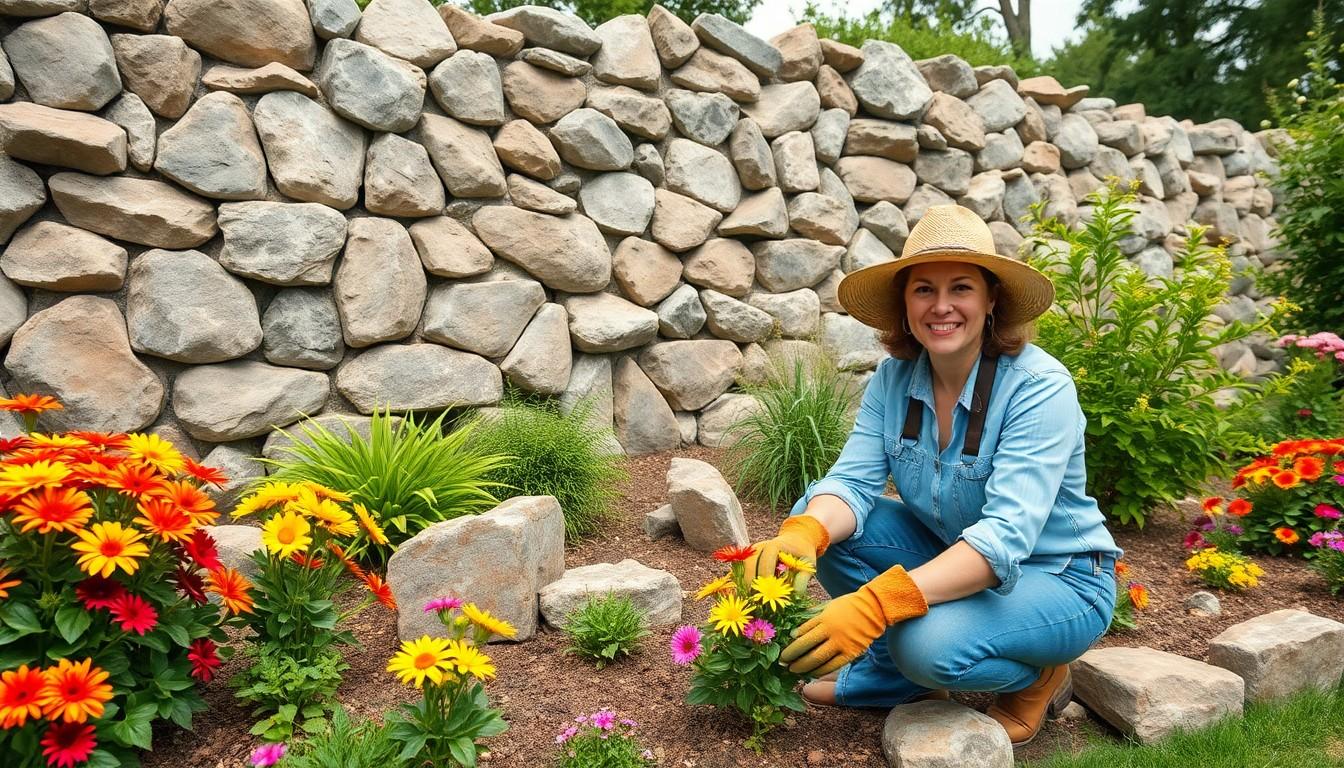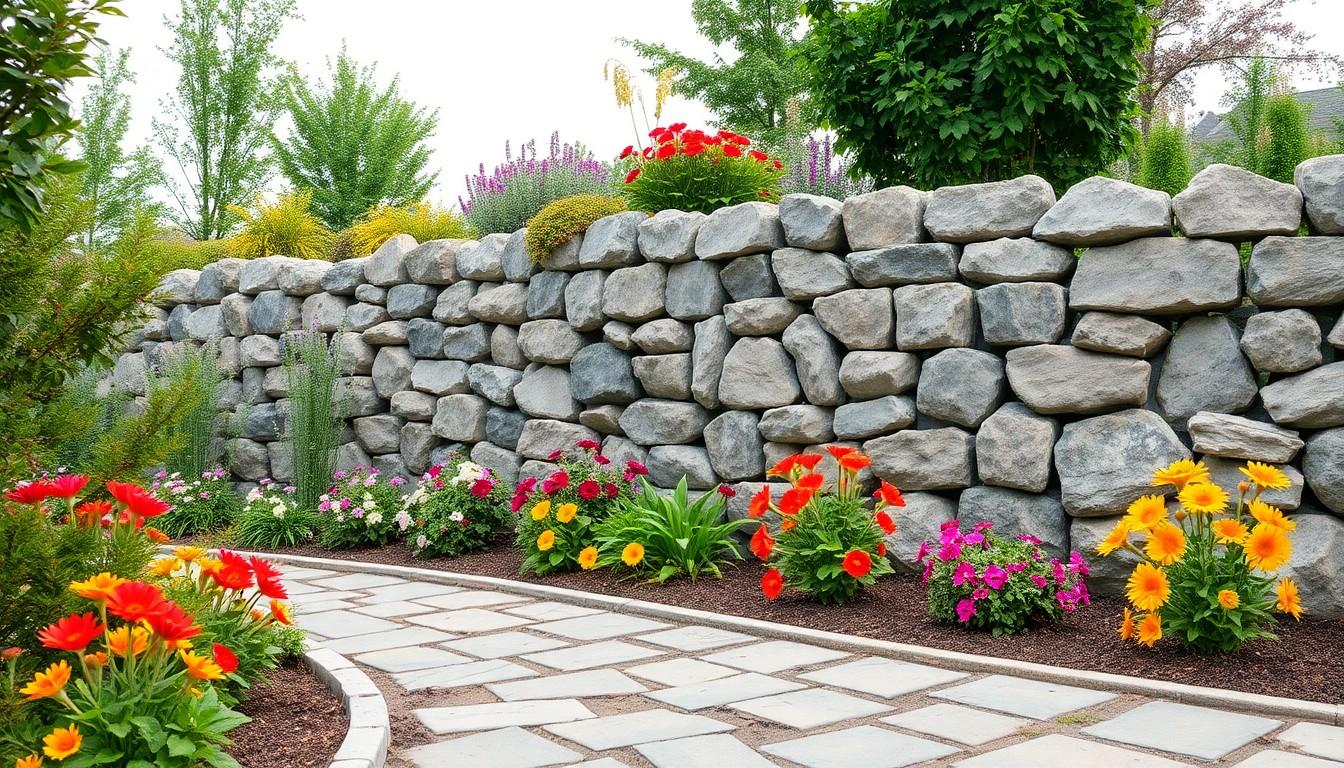The Best Fluffy Pancakes recipe you will fall in love with. Full of tips and tricks to help you make the best pancakes.

Rock Wall Landscaping: Transform Your Outdoor Space with Stunning Stone Designs
Rock wall landscaping isn’t just for mountain goats and adventurous squirrels. It’s a stunning way to elevate outdoor spaces while adding a touch of rustic charm. Imagine transforming your yard into a breathtaking retreat where nature meets artistry. With the right design, those boulders can become the stars of your garden, drawing compliments from neighbors and envy from the local wildlife.
Overview of Rock Wall Landscaping
Rock wall landscaping incorporates natural stones to create unique outdoor features. This method enhances visual appeal, offering an organic look that blends with the environment. Designers often use different styles of rocks, such as boulders, cobblestones, or flagstones, to achieve various effects.
Creating a rock wall involves strategic placement aimed at erosion control and drainage. Properly constructed walls can help define spaces and serve as functional elements in garden designs. In addition, rock walls provide habitats for beneficial wildlife like birds and insects.
Incorporating native plants alongside rock walls fosters a harmonious aesthetic. Locally adapted flora often flourishes in rocky terrains, enhancing biodiversity. Bringing these plants into the design not only boosts visual interest but also supports local ecosystems.
Maintenance remains straightforward with rock wall landscaping. Regular inspections can identify potential issues, such as shifting stones or overgrowth of vegetation. Addressing these concerns promptly preserves the wall’s structural integrity and appearance.
Homeowners appreciate the versatility of rock wall landscaping. It suits a variety of styles, from formal gardens to rustic retreats. With thoughtful planning, rock walls can create stunning backdrops for outdoor activities or serve as focal points in landscapes.
Benefits of Rock Wall Landscaping

Rock wall landscaping offers numerous advantages that enhance both functionality and beauty in outdoor spaces. Its unique characteristics make it a preferred choice for many homeowners.
Durability and Longevity
Rock walls provide exceptional durability and longevity. Natural stones resist weathering from exposure to elements like rain and sunlight. Unlike conventional materials, these structures minimize the need for frequent repairs. When installed correctly, rock walls maintain their integrity over decades. They withstand harsh conditions, including freezing temperatures and heavy rainfall. This resilience contributes to reduced long-term maintenance costs, making them a practical investment for outdoor designs.
Aesthetic Appeal
Rock wall landscaping greatly enhances aesthetic appeal. A variety of stone types allows for diverse visual effects in gardens. Integrating boulders, cobblestones, or flagstones creates unique textures and colors. This diversity adds depth and interest to any outdoor area. Designers can craft smooth, curved formations or rugged, natural looks to match personal styles seamlessly. Additionally, rock structures serve as stunning focal points or background elements that harmonize with surrounding landscapes. The organic integration of stones invites admiration while enriching the overall outdoor experience.
Types of Materials Used
Various materials enhance rock wall landscaping, contributing to its unique character and functionality. Two primary categories exist: natural stones and manufactured stones.
Natural Stone Options
Natural stones provide a timeless appeal and integrate seamlessly with outdoor spaces. Granite, with its strength and variety of colors, suits both structural and decorative purposes. Limestone offers a softer texture, making it ideal for creating rustic designs and blending with gardens. Sandstone features rich hues and layered patterns, adding depth to rock walls. Fieldstone combines irregular shapes and sizes, resulting in a more natural look. Each option provides different aesthetic qualities and durability, allowing homeowners to select based on personal preferences and regional availability.
Manufactured Stone Alternatives
Manufactured stones mimic the appearance of natural stone while offering additional benefits. Lightweight and easier to handle, they simplify installation processes. These stones often feature versatile designs and colors to match specific landscaping themes. Different styles, such as stacked stone or ledgestone, create distinctive textures and patterns. Durability remains high; they resist weathering and can handle moisture effectively. Affordable and consistent in appearance, manufactured stones appeal to those desiring both beauty and practicality in their rock wall landscaping projects.
Design Considerations
Rock wall landscaping requires thoughtful design to maximize its benefits. Each element plays a crucial role in achieving a harmonious outdoor environment.
Planning Your Layout
Begin with determining the desired purpose of the rock wall. Visualize its position and how it will fit within the overall landscape. Consider factors like sunlight and space, as these influence plant health and wall aesthetics. In terms of height, establishing a balance with other features helps maintain a pleasing look. Create zones for different activities, such as seating or planting areas, enhancing usability. Mapping out the layout on paper or digital tools aids in visualizing the arrangement before proceeding.
Integrating with Existing Landscape
Integrating new rock walls requires careful consideration of the existing landscape. Assess surrounding plants, pathways, and structures to ensure visual cohesion. Choosing stones that complement the current materials adds continuity to the design. Utilize native plants around the walls to enhance biodiversity and attract local wildlife. Effective drainage systems should be implemented to prevent water pooling near the foundation. Mimicking natural landforms can create a seamless transition from built to natural environments, reinforcing aesthetic appeal and functionality.
Maintenance Tips for Rock Walls
Regular inspections maintain the integrity of rock walls. Identify any loose stones or signs of erosion promptly. It’s crucial to address these issues immediately to prevent larger problems down the line.
Cleaning the rock surfaces enhances visual appeal. Use a pressure washer or a scrubbing brush for dirt and moss removal. Avoid harsh chemicals, as they can damage natural stone.
Weeding around the rock wall plays a significant role in upkeep. Regularly remove unwanted plants that can compromise the structure and aesthetics. These weeds compete for nutrients and disrupt drainage, impacting the overall health of the landscaping.
Irrigation systems can contribute to maintenance by ensuring proper moisture levels. Install drip irrigation or soaker hoses to prevent water pooling near the rocks. Excess moisture can lead to erosion or stability issues.
Mulching around the base of the rock wall helps retain soil moisture and control weeds. Organic mulches, like bark or leaves, break down to enrich the soil over time. This eco-friendly approach promotes healthy plant growth without harming the stone.
Trimming nearby plants is essential for proper airflow. Overgrown vegetation can lead to increased humidity and shadowing, which may encourage moss growth. This practice helps maintain a clean and inviting look.
Consider seasonal adjustments for rock wall care. In winter, check for ice formation that can damage the structure. Address any drainage issues that may worsen during heavy rains in spring.
Engaging professional landscapers enhances upkeep for extensive rock wall systems. Their expertise ensures optimal materials and techniques tailored to specific environments. Investing in expert advice often leads to long-lasting results and minimal stress.
Conclusion
Rock wall landscaping offers a unique blend of beauty and functionality that can transform any outdoor space. By incorporating natural stones or manufactured options, homeowners can create stunning features that enhance both aesthetics and environmental health. The durability of rock walls ensures they withstand the elements while requiring minimal maintenance, making them a practical choice for any landscape.
With thoughtful design and strategic placement, rock walls can serve as focal points or functional elements that define spaces. They not only elevate visual appeal but also support local wildlife and promote biodiversity. Embracing rock wall landscaping can lead to a more inviting and harmonious outdoor environment that reflects personal style and enhances property value.
